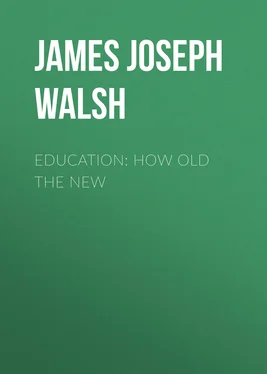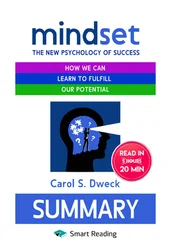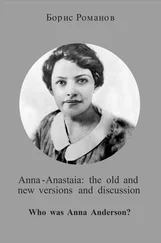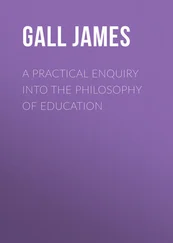James Walsh - Education - How Old The New
Здесь есть возможность читать онлайн «James Walsh - Education - How Old The New» — ознакомительный отрывок электронной книги совершенно бесплатно, а после прочтения отрывка купить полную версию. В некоторых случаях можно слушать аудио, скачать через торрент в формате fb2 и присутствует краткое содержание. Жанр: foreign_prose, foreign_edu, foreign_antique, на английском языке. Описание произведения, (предисловие) а так же отзывы посетителей доступны на портале библиотеки ЛибКат.
- Название:Education: How Old The New
- Автор:
- Жанр:
- Год:неизвестен
- ISBN:нет данных
- Рейтинг книги:3 / 5. Голосов: 1
-
Избранное:Добавить в избранное
- Отзывы:
-
Ваша оценка:
- 60
- 1
- 2
- 3
- 4
- 5
Education: How Old The New: краткое содержание, описание и аннотация
Предлагаем к чтению аннотацию, описание, краткое содержание или предисловие (зависит от того, что написал сам автор книги «Education: How Old The New»). Если вы не нашли необходимую информацию о книге — напишите в комментариях, мы постараемся отыскать её.
Education: How Old The New — читать онлайн ознакомительный отрывок
Ниже представлен текст книги, разбитый по страницам. Система сохранения места последней прочитанной страницы, позволяет с удобством читать онлайн бесплатно книгу «Education: How Old The New», без необходимости каждый раз заново искать на чём Вы остановились. Поставьте закладку, и сможете в любой момент перейти на страницу, на которой закончили чтение.
Интервал:
Закладка:
A difficult problem; presents will not solve it but only complicate it, exact justice is necessary, but the peace that follows is worth the trouble it entails. The principle would be valuable in many a squabble of corporate employer and hosts of servants in the modern time.
For domestic happiness, it needed only the advice given a little later in this instruction: "Let thy face be bright what time thou livest. Bread is to be shared. He that is grasping in entertainment himself shall have an empty belly. He that causeth strife cometh himself to sorrow. Take not such a one for thy companion. It is a man's kindly acts that are remembered of him in the years after his life."
There is one phase of life in which Ptah Hotep differs entirely from the present generation,–at least if we are to judge the present generation from its results in this matter. Of course there are many of us who consider that, in spite of six thousand years of distance in time, the old Egyptian prime minister is far ahead of our contemporaries in this important subject. He thought that obedience was the most important thing in life. For him independence of spirit, in a young person particularly, was an abomination. In spite of the tendency to loquacity and to repeat itself, often said to be so characteristic of old age, the father, who in all his instructions has never sinned against this literary canon, almost seems to do so when it comes to the question of obedience. Over and over again he insists that obedience is the one quality that must characterize a man if he is to get on in life, and if he is to secure happiness, and have a happy generation of his own group around him. The sentences read more like à Kempis or some mediaeval writer on spirituality, and seem meant for monks under obedience rather than for a young man of the world, the son of a prime minister, just about to enter on his life work in business and politics. Two of the paragraphs are well worth quoting here:
"A splendid thing is the obedience of an obedient son; he cometh in and listeneth obediently. Excellent in hearing, excellent in speaking, is every man that obeyeth what is noble. The obedience of an obeyer is a noble thing. Obedience is better than all things that are; it maketh good will. How good it is that a son should take that from his father by which he hath reached old age [obedience]! That which is desired by the God is obedience; disobedience is abhorred of the God. Verily, it is the heart that maketh its master to obey or to disobey; for the safe-and-sound life of a man is his heart. It is the obedient man that obeyeth what is said; he that loveth to obey, the same shall carry out commands. He that obeyeth becometh one obeyed. It is good indeed when a son obeyeth his father; and he (his father) that hath spoken hath great joy of it. Such a son shall be mild as a master, and he that heareth him shall obey him that hath spoken. He shall be comely in body and honored by his father. His memory shall be in the mouths of the living, those upon earth, as long as they exist.
"As for the fool, devoid of obedience, he doeth nothing. Knowledge he regardeth as ignorance, profitable things as hurtful things. He doeth all kind of errors, so that he is rebuked therefor every day. He liveth in death therewith. It is his food. At chattering speech he marvelleth, as at the wisdom of princes, living in death every day. He is shunned because of his misfortunes, by reason of the multitude of afflictions that cometh upon him every day."
Of one thing the old prime minister was especially sure. It was that employment at no single occupation, no matter what it was or how interesting soever it might be, could satisfy a man or even keep him in good health. He felt, probably by experience, the necessity for diversity of mind and of occupation, if there was to be any happiness or any real success in life. He has a quiet way of putting it, but he says, as confidently as the most modern of pedagogues, that all work and no play makes Jack a dull boy, and all play and no work makes it impossible for Jack to get on. But a proper mixture of both makes life livable; and if a man has only the work that he cares for, and can get some of his pleasure in life out of his work, then is all well. "One that reckoneth accounts all the day passeth not an happy moment. One that gladdeneth his heart all the day provideth not for his house. The bowman hitteth the mark, as the steersman reacheth land, by diversity of aim. He that obeyeth his heart shall command."
There are some conclusions in the philosophy of life that we are very much inclined to think are the products of modern practical wisdom, and it is rather surprising to find them stated plainly in this old-time advice of the father to his boy. If there is one idea more than another that we are confident is modern, and are almost sure to attribute to the social development of our own generation, it is that riches do not belong to the man who makes them to be used for his own purpose alone, but their possession is justified only if he uses them for the benefit of the community. This is so up-to-date an idea indeed that it is startling to find it expressed in all its completeness in this oldest of books. Ptah Hotep said: "If thou be great after being of no account, and hast gotten riches after poverty, being foremost in these in the city, and hast knowledge concerning useful matters so that promotion is come unto thee, then swathe not thine heart in thine hoard, for thou art become the steward of the endowments [of God]. Thou art not the last; another shall be thine equal, and to him shall come the like [fortune and station]."
After all this it may be necessary to trace the pedigree of the book, since it might seem to be possible that it was a modern invention. The original of it is the so-called "Prisse Papyrus," which is well known by name to all students of archaeology and especially of Egyptology, and the contents of which are familiar to all who are acquainted with Egyptian history and literature. It appears to have been found at Thebes, but the exact place is not known. M. Prisse d'Avennes, the well-known French archaeologist after whom it is named, is said to have bought it from one of the Egyptian native workmen, or fellahin, whom he had hired to make excavations in the tombs of Thebes. Egyptologists generally have accepted the idea that it was actually taken by this workman from the tomb of one of the Kings Entef, who were of the Eleventh Dynasty and reigned about 3000 B.C. This is not certain, however. After publishing a translation in 1847, M. Prisse presented the precious papyrus to the Bibliothèque Royale (now Nationale). There it may still be seen. Spread out flat, it measures about twenty-four feet in length and six inches in width. There are about eighteen pages of clear red and black writing in the Hieratic character.
The first part of this manuscript is a portion of another book, the so-called "Instructions of Ke'gemni." 4 4 These Egyptian names are spelled differently by different modern scholars, according to their idea of the value of certain sounds of the older language as they should be expressed in the modern tongue to which they are most familiar. Many English scholars spell this as I have done, Ke'gemni. Maspero, however, and most of the French scholars, spell it Qaqimni. Maspero prefers the form Phtah-Hotpû to that of Ptah Hotep, which has been adopted by English scholars.
This is, however, only a short fragment, though probably of even older date than the "Instructions of Ptah Hotep." This work we have in its entirety. Doubtless its preservation was due to the fact that many copies of it had been made, though only two have come down to us.
There is a second manuscript of the "Instructions of Ptah Hotep,"–or the "Proverbs of Phtahhotpû," as the book is called by Maspero. This was discovered not long ago in the British Museum, by Mr. Griffith; and, while it is not so complete as the French copy, there is such an agreement between the two manuscripts that there is no doubt about the authenticity of the book and of the fact that it represents the oldest book in the world.
Читать дальшеИнтервал:
Закладка:
Похожие книги на «Education: How Old The New»
Представляем Вашему вниманию похожие книги на «Education: How Old The New» списком для выбора. Мы отобрали схожую по названию и смыслу литературу в надежде предоставить читателям больше вариантов отыскать новые, интересные, ещё непрочитанные произведения.
Обсуждение, отзывы о книге «Education: How Old The New» и просто собственные мнения читателей. Оставьте ваши комментарии, напишите, что Вы думаете о произведении, его смысле или главных героях. Укажите что конкретно понравилось, а что нет, и почему Вы так считаете.












